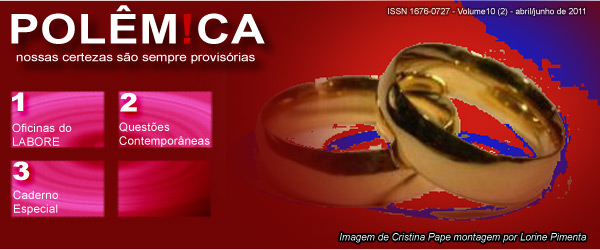EXCLUSÃO ESCOLAR ou SÍNDROME da EXCLUSÃO SOCIAL?
DOI:
https://doi.org/10.12957/polemica.2011.2858Resumo
Para milhões de descendentes da escravatura a exclusão escolar é apenas uma etapa do processo excludente ao qual estão submetidos há séculos e chamar a atenção para este fenômeno é um dos objetivos deste artigo. Essas pessoas vivendo no interior do país ou, principalmente, nos bolsões de pobreza das regiões metropolitanas, são expostas a múltiplos fatores de risco desde a gestação, nos períodos de lactente e pré-escolar. Quando ingressam na 1ª série do ensino fundamental já estão impactadas biopsicossocialmente. Entretanto, para agravar o impacto, durante os períodos, escolar, de adolescente e de adulto jovem, o fenômeno excludente não deixa de atuar sobre essas pessoas, que continuam expostas a diferentes fatores adversos. Estes, juntamente com os danos subjetivos resultantes, auto-excludentes, dificultam a inclusão social desses indivíduos impossibilitando-os de permanecerem na escola aprendendo e, mais tarde, se realizarem profissionalmente. Constata-se, portanto, que a exclusão escolar, para este grupo é apenas uma faceta de um fenômeno maior chamado de “Síndrome da Exclusão Social” da qual são vítimas seculares. A solução depende de intervenções concomitantes dentro e além dos muros da escola; interdisciplinares, intersetoriais, com base na comunidade. Devem ser iniciadas na gestação e mantidas em todos os períodos do ciclo de vida.
Palavras-chave: exclusão social, fatores de risco, exclusão escolar, síndrome
Downloads
Publicado
Como Citar
Edição
Seção
Licença
Cabem ao autor/autora os direitos autorais dos artigos publicados na Polêm!ca, resguardando-se à revista o direito de primeira publicação. Cientes, revista e autores/as, que todos os artigos são de uso gratuito, para fins educacionais e não-comerciais, permitindo que outros remixem, adaptem e construam sobre o trabalho, desde que citada a fonte, quando da sua utilização integral ou parcial, de acordo com a licença Creative Commons CC BY-NC.
O(s) autor(es) tem/têm autorização para assumir contratos adicionais separadamente, para distribuição não-exclusiva da versão do trabalho publicada nesta revista (ex.: publicar em repositório institucional ou como capítulo de livro), com reconhecimento de autoria e publicação inicial nesta revista.
Respeitando a licença autoral adotada pela Polêm!ca, estimulamos nossos leitores a promover, refletir e escrever, a partir das nossas publicações, incluindo nas citações o link para o artigo disponível no site da Revista Polêm!ca, sempre que um artigo for citado ou replicado, e observando a grafia correta do nome da revista Polêm!ca.
Todo o conteúdo de terceiros (imagens, trechos, citações, etc.) deverá possuir referências a sua fonte original adicionadas como notas de rodapé ou referências bibliográficas com sua devida identificação.
Artigos submetidos que contiverem citações, tabelas ou imagens extraídas de outras publicações não serão aceitos, caso possuam mais conteúdo de terceiros do que conteúdo original.

Revista Polêm!ca está licenciada com uma Licença Creative Commons Atribuição-NãoComercial 4.0 Internacional.



